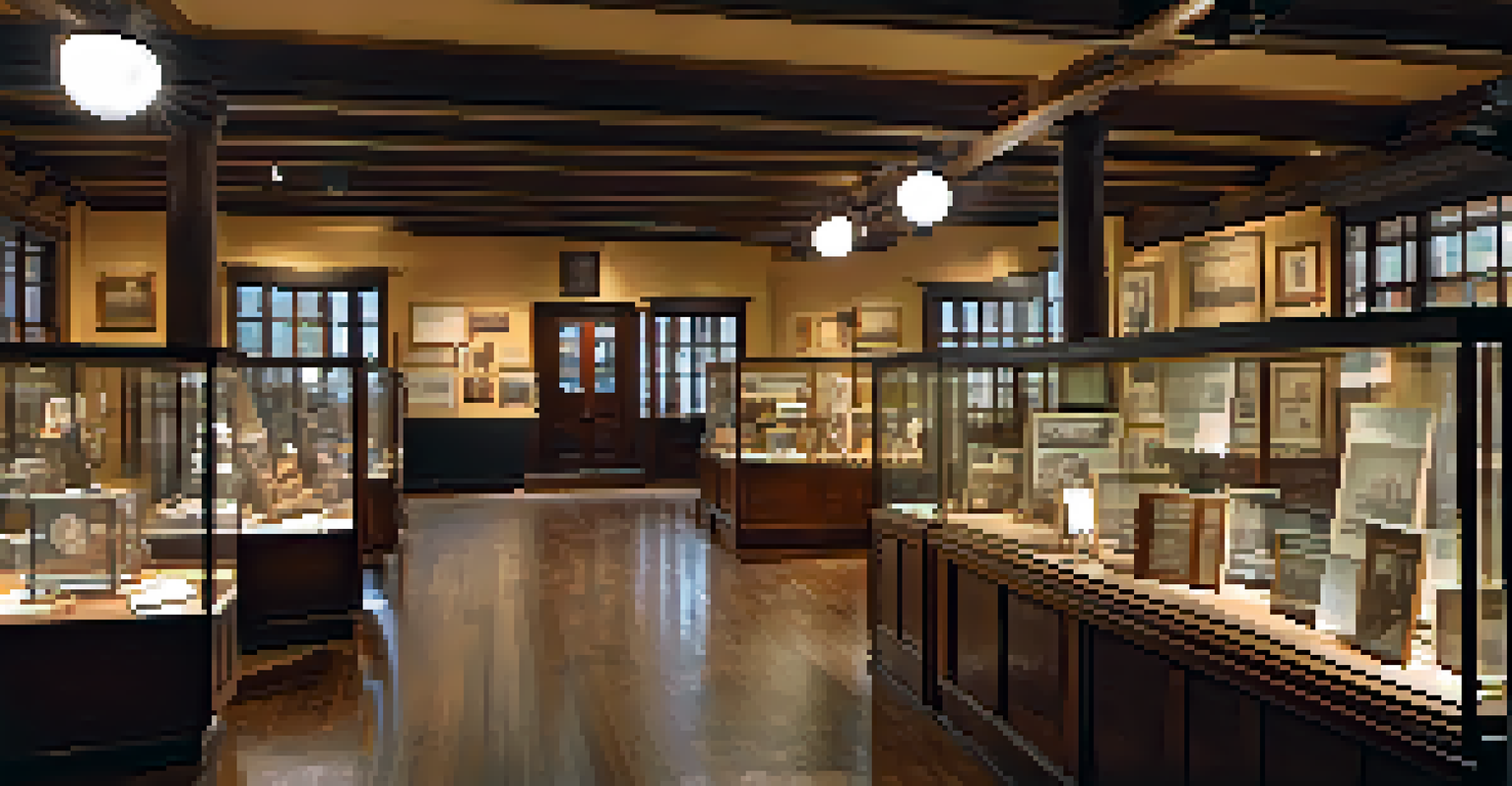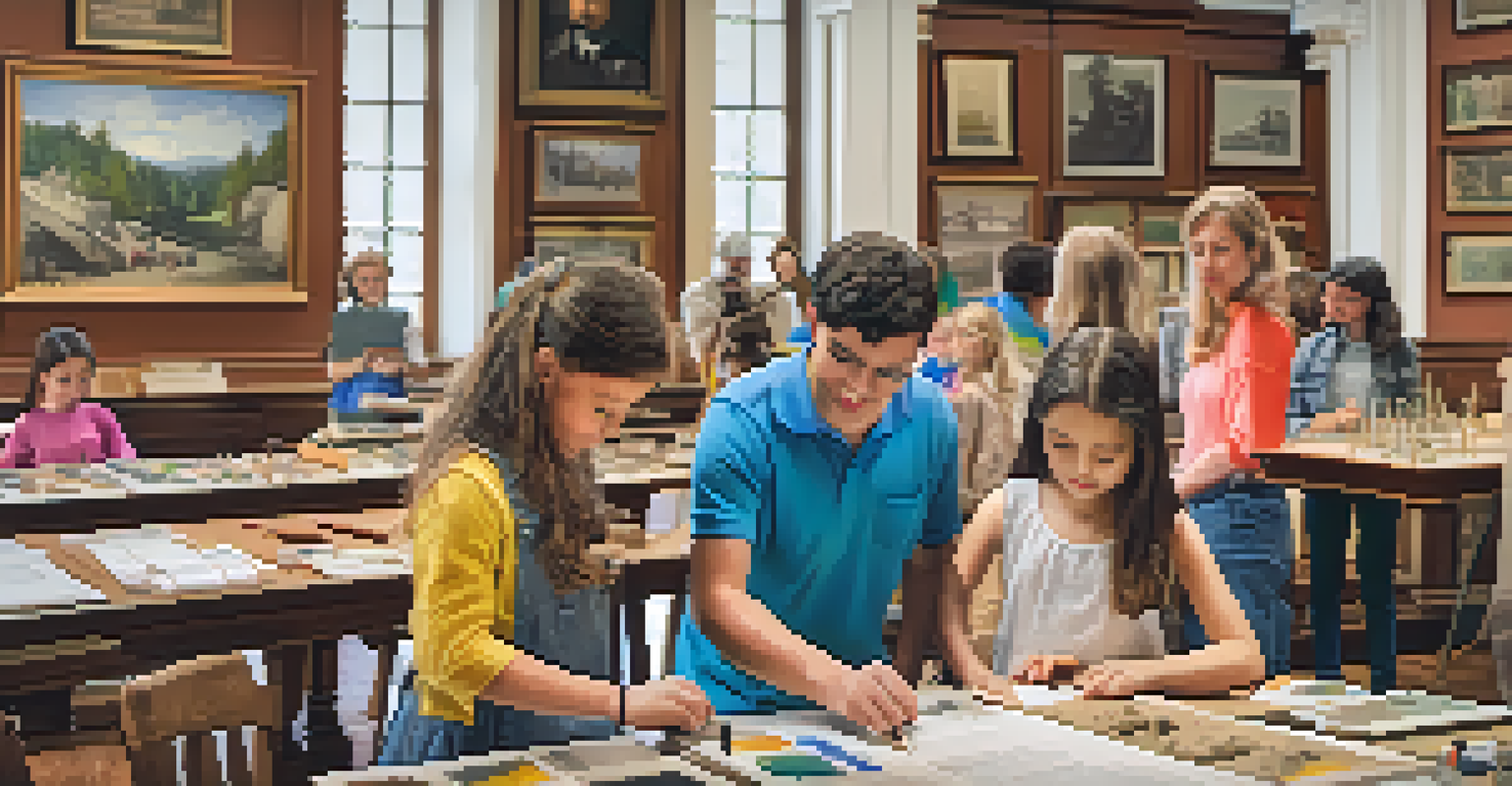Visiting Historical Societies: A Journey Through Local History

Understanding the Role of Historical Societies
Historical societies serve as treasure troves of local history, preserving artifacts, documents, and stories that reflect the cultural heritage of a community. They play a crucial role in educating the public about their past, making history accessible and engaging. By showcasing local events, notable figures, and forgotten tales, these societies help residents connect with their roots.
History is not a burden on the memory but an illumination of the soul.
Imagine stepping into a time capsule where every exhibit tells a story, inviting you to explore the lives of those who came before us. Whether it's a quaint building filled with photographs or a vast archive of documents, historical societies provide a unique glimpse into a community’s evolution over the years. They often host events that bring history to life, making it a great outing for families and history buffs alike.
Moreover, these organizations foster a sense of community by encouraging local involvement and volunteerism. By participating in society activities, you can meet like-minded individuals who share a passion for history. This camaraderie can turn into lasting friendships, all while deepening your understanding of the local narrative.
Planning Your Visit: What to Expect
When you decide to visit a historical society, it's helpful to plan ahead. Many societies have specific hours for visitors, so checking their website or calling ahead is a good idea. Some may even require reservations for guided tours, especially if they are particularly popular or have special exhibits on display.

Once you arrive, you can expect a warm welcome from staff and volunteers who are passionate about sharing their knowledge. They are often eager to provide insights and answer questions, making your visit more enriching. Some societies may even have interactive displays or workshops that allow you to engage with history in a hands-on way.
Explore Local History Hands-On
Visiting historical societies allows you to engage with artifacts and exhibits, creating a personal connection to the past.
Don't forget to check the gift shop, if available! Many historical societies sell books, local crafts, and memorabilia that can serve as great souvenirs or gifts. These purchases not only support the society but also help spread awareness of local history.
Engaging with Exhibits: A Hands-on Experience
One of the most exciting aspects of visiting a historical society is exploring their exhibits. These displays often include photographs, clothing, tools, and documents that illustrate the daily lives of people in the past. Engaging with these artifacts allows visitors to develop a personal connection to history, making it feel more relevant and immediate.
The farther backward you can look, the farther forward you are likely to see.
As you walk through the exhibits, take your time to read the descriptions and ask questions. Many historical societies have knowledgeable staff available to provide deeper insights into the items on display. This interaction can lead to fascinating stories and facts that you might not find in textbooks.
Additionally, some societies offer themed exhibits that focus on specific aspects of local history, such as immigration, industry, or social movements. These rotating exhibits keep the experience fresh and encourage repeat visits, as each trip can uncover new stories and perspectives.
Participating in Events and Workshops
Historical societies frequently host events that are both educational and entertaining. From lectures and panel discussions to hands-on workshops, there’s often something for everyone. Participating in these activities allows you to dive deeper into specific topics and learn from experts in the field.
For example, you might find a workshop on local genealogy, teaching you how to trace your family's roots. Or perhaps a lecture on the impact of local industries during a specific era. These events can be a great way to engage with history in a way that feels personal and relevant.
Participate in Community Events
Historical societies offer a variety of events and workshops that deepen your understanding of local history and foster community connections.
Moreover, attending events can provide networking opportunities with historians, authors, and fellow history enthusiasts. These connections can lead to further exploration of your interests and even inspire future projects or research endeavors.
Connecting with Local Historians
One of the benefits of visiting historical societies is the chance to meet local historians and archivists. These individuals often have a wealth of knowledge and can provide insights that go beyond what you might read in books. They can share personal anecdotes and lesser-known facts that bring history to life.
Engaging with these experts can also help you understand the context behind various artifacts and exhibits. For instance, they might explain the significance of a particular event in local history and how it relates to broader national trends. This kind of context is invaluable for a deeper appreciation of the past.
In some cases, you may even have the opportunity to collaborate with local historians on projects or research. This interaction fosters a sense of community and shared purpose, allowing you to contribute to the preservation and understanding of local history.
Volunteering: Giving Back to Your Community
If you find yourself inspired by your visit to a historical society, consider volunteering. Many societies rely on the help of community members to maintain their collections, organize events, and conduct research. Volunteering can be a rewarding way to give back while deepening your connection to local history.
Even a few hours a month can make a significant impact. Whether it's helping to catalog artifacts, leading tours, or assisting with educational programs, your contribution will be appreciated. Plus, you'll gain hands-on experience and skills that can be beneficial in various fields.
Support Preservation Efforts
By visiting and volunteering at historical societies, you contribute to the preservation of local history for future generations.
Volunteering also allows you to meet others who share your passion for history. These connections can lead to friendships and collaborations on projects that promote local heritage. It's a wonderful way to immerse yourself in the community while making a difference.
Preserving Local History for Future Generations
Visiting historical societies is not just about exploring the past; it's also about ensuring that local history is preserved for future generations. By supporting these organizations, you contribute to their mission of safeguarding artifacts and stories that might otherwise be lost. This preservation work is crucial in maintaining the identity and culture of a community.
In addition to physical artifacts, many societies are now digitizing their collections to make them accessible online. This effort helps reach a wider audience, allowing people from all over the world to learn about your local history. It's a wonderful way to share your community's stories and engage with a global audience.

Ultimately, your visit to a historical society can inspire a sense of responsibility towards preserving history. By becoming involved, whether through visiting, volunteering, or supporting their initiatives, you play a vital role in keeping local stories alive for years to come.